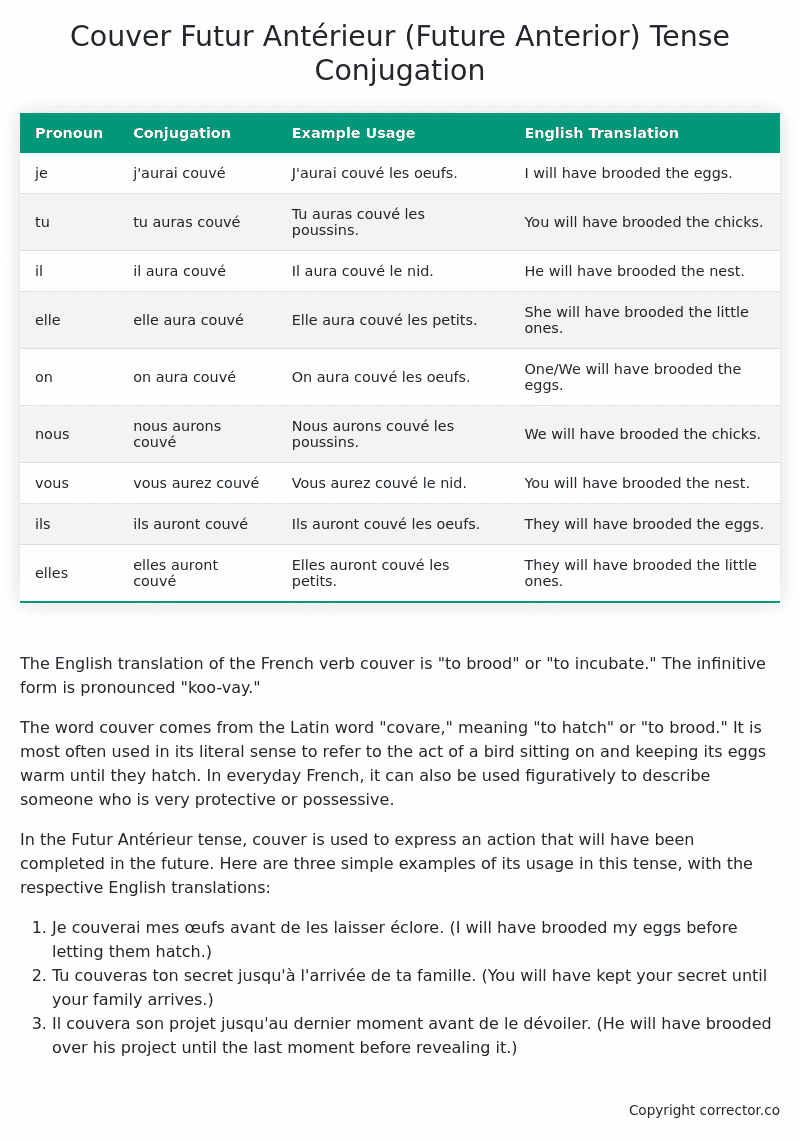Futur Antérieur (Future Anterior) Tense Conjugation of the French Verb couver
Introduction to the verb couver
The English translation of the French verb couver is “to brood” or “to incubate.” The infinitive form is pronounced “koo-vay.”
The word couver comes from the Latin word “covare,” meaning “to hatch” or “to brood.” It is most often used in its literal sense to refer to the act of a bird sitting on and keeping its eggs warm until they hatch. In everyday French, it can also be used figuratively to describe someone who is very protective or possessive.
In the Futur Antérieur tense, couver is used to express an action that will have been completed in the future. Here are three simple examples of its usage in this tense, with the respective English translations:
- Je couverai mes œufs avant de les laisser éclore. (I will have brooded my eggs before letting them hatch.)
- Tu couveras ton secret jusqu’à l’arrivée de ta famille. (You will have kept your secret until your family arrives.)
- Il couvera son projet jusqu’au dernier moment avant de le dévoiler. (He will have brooded over his project until the last moment before revealing it.)
Table of the Futur Antérieur (Future Anterior) Tense Conjugation of couver
| Pronoun | Conjugation | Example Usage | English Translation |
|---|---|---|---|
| je | j’aurai couvé | J’aurai couvé les oeufs. | I will have brooded the eggs. |
| tu | tu auras couvé | Tu auras couvé les poussins. | You will have brooded the chicks. |
| il | il aura couvé | Il aura couvé le nid. | He will have brooded the nest. |
| elle | elle aura couvé | Elle aura couvé les petits. | She will have brooded the little ones. |
| on | on aura couvé | On aura couvé les oeufs. | One/We will have brooded the eggs. |
| nous | nous aurons couvé | Nous aurons couvé les poussins. | We will have brooded the chicks. |
| vous | vous aurez couvé | Vous aurez couvé le nid. | You will have brooded the nest. |
| ils | ils auront couvé | Ils auront couvé les oeufs. | They will have brooded the eggs. |
| elles | elles auront couvé | Elles auront couvé les petits. | They will have brooded the little ones. |
Other Conjugations for Couver.
Le Present (Present Tense) Conjugation of the French Verb couver
Imparfait (Imperfect) Tense Conjugation of the French Verb couver
Passé Simple (Simple Past) Tense Conjugation of the French Verb couver
Passé Composé (Present Perfect) Tense Conjugation of the French Verb couver
Futur Simple (Simple Future) Tense Conjugation of the French Verb couver
Futur Proche (Near Future) Tense Conjugation of the French Verb couver
Plus-que-parfait (Pluperfect) Tense Conjugation of the French Verb couver
Passé Antérieur (Past Anterior) Tense Conjugation of the French Verb couver
Futur Antérieur (Future Anterior) Tense Conjugation of the French Verb couver (this article)
Subjonctif Présent (Subjunctive Present) Tense Conjugation of the French Verb couver
Subjonctif Passé (Subjunctive Past) Tense Conjugation of the French Verb couver
Subjonctif Imparfait (Subjunctive Imperfect) Tense Conjugation of the French Verb couver
Subjonctif Plus-que-parfait (Subjunctive Pluperfect) Tense Conjugation of the French Verb couver
Conditionnel Présent (Conditional Present) Tense Conjugation of the French Verb couver
Conditionnel Passé (Conditional Past) Tense Conjugation of the French Verb couver
L’impératif Présent (Imperative Present) Tense Conjugation of the French Verb couver
L’infinitif Présent (Infinitive Present) Tense Conjugation of the French Verb couver
Struggling with French verbs or the language in general? Why not use our free French Grammar Checker – no registration required!
Get a FREE Download Study Sheet of this Conjugation 🔥
Simply right click the image below, click “save image” and get your free reference for the couver Futur Antérieur tense conjugation!

Couver – About the French Futur Antérieur (Future Anterior) Tense
Construction
Common Everyday Usage Patterns
Interactions with Other Tenses
For example
Summary
I hope you enjoyed this article on the verb couver. Still in a learning mood? Check out another TOTALLY random French verb conjugation!


